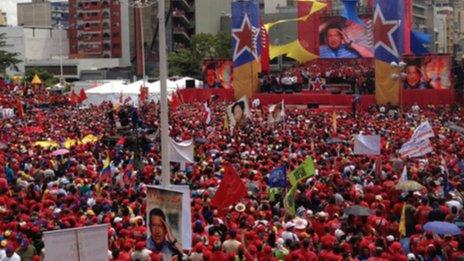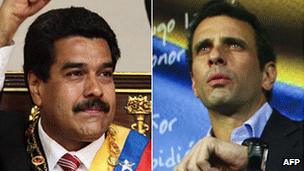Venezuela readies for key post-Chavez election
- Published

Big crowds turned out to see Nicolas Maduro register as presidential candidate
As Venezuela prepares for 14 April elections - the first presidential poll without Hugo Chavez's name on the ballot in almost two decades - the choice for voters appears as stark and as divisive as ever, the BBC's Will Grant in Caracas reports.
While he was alive, very few committed supporters of late President Hugo Chavez would ever openly criticise him.
They had no time for opposition arguments about the government's control of the media and the judiciary, and rejected the idea that Venezuela was living under a dictatorship.
Rather, when there were complaints they tended to be over more immediate quality-of-life issues: infrequent rubbish collections or a lack of local sporting facilities.
In pro-Chavez neighbourhoods - like 23 de Enero in the capital, Caracas - such problems were easily solved with oil money.
Shouting over the noise of a gleaming-new government rubbish truck as it crushes the mountains of waste outside her building, local co-operative leader Judith Vegas explains how she has enjoyed a direct line to the Chavez government for years.
She shows us around a brand new baseball ground and takes us on the shiny lifts which the socialist administration installed in the crumbling 1950s housing blocs.
In her state-owned apartment, Judith cannot hold back her tears when talking about Hugo Chavez.
"It hurts me what's happening," she says between sobs. "I loved him and everything he did for us."
For Judith, the most fitting tribute to the late socialist leader is a vote for his chosen successor, Nicolas Maduro, in next month's election.
"We'll love Maduro, too. The absence of Chavez won't mean that things will stop here. No. Chavez is inside all of us."
But her support for Mr Maduro isn't completely unconditional.
"It's not that we don't trust him but he must follow the lines which Chavez left down to the letter so that this revolution can continue.

"If he fails to do so, he will come up against the people on 14 April," she warns, before adding brightly: "But I'm sure he won't."
'Commando Hugo Chavez'
Millions of like-minded Chavistas agree.
Although campaigning doesn't officially get underway until 2 April, tens of thousands turned out to the National Electoral Council earlier this month to see Mr Maduro hand in his credentials as presidential candidate.
The rally outside was, in all but name, an election campaign event.
Unsurprisingly, Mr Chavez's image is emblazoned across all of the United Socialist Party's election propaganda.
"We are trying to choose between two names for the campaign team," Nicolas Maduro told the assembled crowd.
"It's between 'Commando Battle of Carabobo,'" he said to muted murmurs, "or 'Commando Hugo Chavez'!" he cried - to rapturous applause.
"Approved! My election team will be called Commando Hugo Chavez!" the acting president declared.
One of the Commando's main leaders is Energy Minister Rafael Ramirez.
He opened the doors of his office to BBCMundo - in a rare at-length interview in the days immediately after Mr Chavez's death.
He was still wearing the armband in the colours of the Venezuelan flag which all of Mr Chavez's inner circle had worn at his funeral.
"Without doubt we have lost the most important leader of the 20th and 21st Century," Mr Ramirez opened by saying.
"I have been his oil minister for 10 uninterrupted years. President Chavez wasn't just our boss and our leader, he was our friend."
When the discussion turned to the election, Mr Ramirez was adamant about what he believed April's vote entailed.
"This is a referendum to confirm the political will already expressed by the people last October (in the presidential election which Mr Chavez won by 11%) and then again in December when we won 20 of the 23 governorships in the country."
And he was typically dismissive of the chances of the opposition's candidate, Henrique Capriles.
"There is no way that the right wing will again govern this country. And much less, these men."
'Unique opportunity'
In opposition circles, they know they face an extremely tough prospect against a man hand-picked by Mr Chavez the day before his final cancer operation.
Nevertheless, Mr Capriles is showing a far more aggressive style against Mr Maduro than he did against Mr Chavez last year, resolutely refusing to call him president and referring to him instead as just "Nicolas".
There is even an outside possibility of a televised debate between the candidates - something Mr Chavez never countenanced.
In an interview earlier this year, before Mr Chavez's death, opposition leader Maria Corina Machado spoke of the prospects for the opposition in a post-Chavez Venezuela.
"After 14 years of control of the media, resources and all the public powers, in our last electoral processes, which were not clear and fair processes, almost half the population voted against (Hugo Chavez)."
"That shows that Venezuelans understand the true nature of the regime which tries to be imposed on us: a regime in which citizens are dependent on the government and are not allowed the right to disagree or dissent."
This was "a wonderful, unique opportunity to produce a true transformation of our society", she added.
In the country's first presidential election without Hugo Chavez's name on the ballot in almost 20 years, it seems the choice in front of Venezuelans remains as stark and as divisive as ever.
- Published11 March 2013
- Published11 March 2013